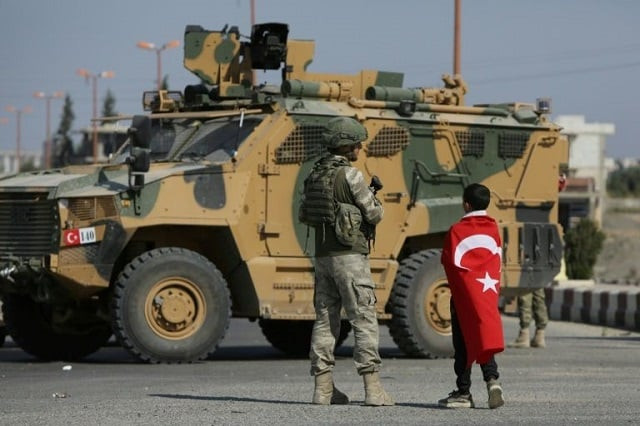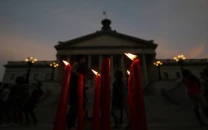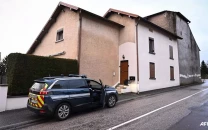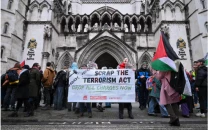Kurdish forces start Syria-Turkey border pullback
Deal signed by Syria's foreign brokers gives Kurdish forces until Tuesday to withdraw to a line 30km from the border

Turkish soldiers patrol the Syrian border town of Tal Abyad, part of an Arab-majority strip along the frontier where Ankara will retain full control under the deal reached with Moscow. PHOTO: AFP
Even as troops withdrew, the Kurds' top commander threw his weight behind a German-led plan for an internationally secured security zone in the country's north.
Russian forces have started patrols along the flashpoint frontier, filling part of the vacuum left by a US troop withdrawal that effectively returned a third of the country to the Moscow-backed regime of President Bashar al-Assad.
An AFP correspondent saw a Russian patrol set off from the town of Qamishli westwards along the Turkish border flying the country's flags, accompanied by Kurdish security forces.
No Syria-type pullout planned for Afghanistan, says Pentagon chief
US President Donald Trump has praised the agreement reached in Sochi between Nato member Turkey and Russia, and rejoiced that US personnel were leaving the "long blood-stained sand" of Syria, leaving just a residual contingent behind "where they have the oil."
The deal signed in the Black Sea resort by Syria's two main foreign brokers gives Kurdish forces until Tuesday to withdraw to a line 30 kilometres (19 miles) from the border.
The Syrian Observatory for Human Rights reported that the Kurdish-led Syrian Democratic Forces (SDF) had pulled out of some areas at the eastern end of the border on Thursday.
Fighters from the Kurdish People's Protection Units (YPG) -- the main component of the SDF -- remained in many positions along the 440 kilometre border, said the Britain-based war monitor's head, Rami Abdel Rahman.
The Observatory also reported clashes near the town of Tal Tamr between SDF fighters and some of the Syrian former rebels paid by Turkey to fight ground battles.
SDF commander Mazloum Abdi on Twitter accused the Turkish-led forces of violating the truce on the eastern front of Ras al-Ain.
"The guarantors of the ceasefire must carry out their responsibilities to rein in the Turks," he added on Twitter.
The events were set to provoke "forceful" discussion at a Nato defence ministers' meeting in Brussels on Thursday and Friday, but Ankara risked little because of its strategic position, diplomats said.
Speaking to journalists later on Thursday, Abdi threw his weight behind a German-led plan for an international force to establish a security zone in northern Syria.
The plan, details of which remain unclear, is expected to be discussed at the Nato meeting.
"We have communicated with many European countries, including those who announced the initiative," Abdi said.
"I think it is under development... It needs American and Russian support."
There is no indication Russia or Turkey will support the plan, and Russian and Syrian government forces were deploying across Kurdish heartlands on Thursday.
Kurdish forces had already vacated a 120-kilometre segment of the border strip -- an Arab-majority area between the towns of Ras al-Ain and Tal Abyad.
The SDF withdrawal from that area came after Turkey and its Syrian proxies launched their deadly cross-border offensive on October 9.
Turkish President Recep Tayyip Erdogan, who is embattled on the domestic political front, hopes to use the pocket to resettle at least half of the 3.6 million Syrian refugees his country hosts.
Under the Sochi deal, the area will remain under the full control of Turkey, unlike the rest of the projected buffer zone which will eventually be jointly patrolled by Turkey and Russia.
Some 300,000 people have fled their homes since the start of the Turkish offensive and many Kurds among them seem unlikely to return.
Trump lifts Turkey sanctions, quits 'blood-stained' Syria
US forces pulled back from the border area earlier this month, a move the Kurds saw as a betrayal but which Trump had been discussing since last year.
Kurds, who had built an autonomous administration in Syria over the course of the country's war, had hoped that the sacrifices they made to help crush the Islamic State group's "caliphate" would win rewards.
But Trump has been keen to keep a promise to remove his troops from Syria, where IS territorial control collapsed in March but where conflict continues.
"Let someone else fight over this long blood-stained sand," he said in a White House speech on Wednesday.
The American withdrawal leaves Russia as the undisputed main foreign power in Syria, to Assad's great benefit.
"Assad is getting back a third of Syria's territory without firing a shot," geographer and Syria specialist Fabrice Balanche said.
Some US forces remain in eastern districts of Syria, where government forces have been deploying but have not yet re-established full control.






1644560129-0/download-(20)1644560129-0-208x130.webp)











COMMENTS
Comments are moderated and generally will be posted if they are on-topic and not abusive.
For more information, please see our Comments FAQ